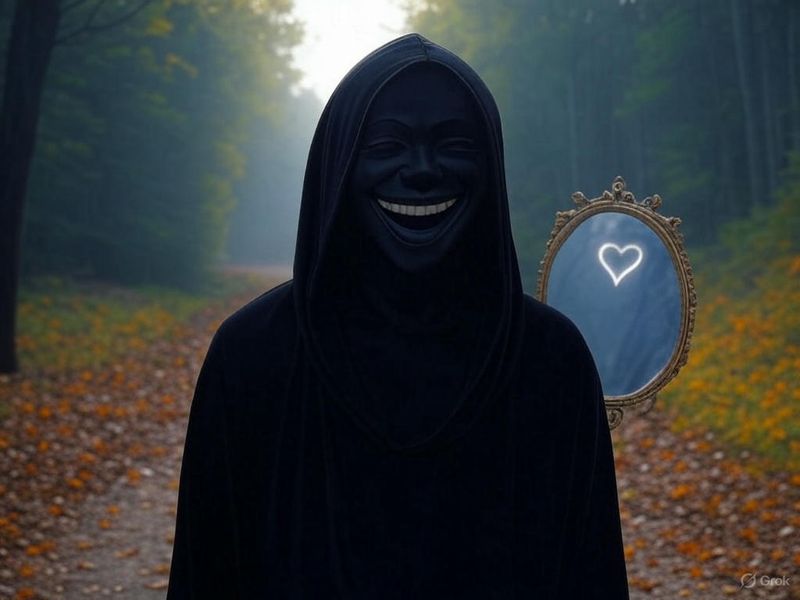Title: Embracing the Shadow: Self-Acceptance and Dark | 1being

Title: Embracing the Shadow: Self-Acceptance and Dark Humor on the Spiritual Path
Summary:
Explore the challenge of accepting parts of ourselves that seem to drift from spiritual ideals, such as an appreciation for dark humor or a perceived loss of innocence. Drawing from Confederation teachings, this post examines how to embrace these aspects with love and forgiveness, rather than shame, while continuing to evolve spiritually. It offers practical guidance for seekers to balance self-acceptance with growth, using dark humor as a lens to understand the self more deeply.
Blog Post:
As we journey along the spiritual path, we often hold ourselves to lofty ideals—striving to embody love, purity, and wisdom. Yet, there are moments when we encounter parts of ourselves that don’t seem to fit this mold. Perhaps we find ourselves laughing at a dark joke, amused by something twisted or grim, even as a voice within whispers, “I should be better than this. I should be more spiritual.” This tension—between who we are and who we think we ought to be—can stir feelings of shame or disconnection, especially as life’s experiences pull us further from the innocence we once knew. How, then, do we accept these aspects of ourselves without judgment, while still moving forward on our spiritual journey?
The Confederation teachings, as channeled through entities like Q’uo, offer profound insight into this struggle. Q’uo reminds us that “it is entirely possible to fully balance self-acceptance as the self is, however dark the, or shall we say, seemingly dark the humor… and also to see that work is needed that perhaps more skillful choices can be made” (from the user query). This balance is key: accepting ourselves as we are in this moment, while gently acknowledging areas for growth, all rooted in love rather than condemnation.
Dark humor, as an example, often emerges as we navigate a world filled with complexity and suffering. Losing innocence isn’t a fall from grace but a natural part of our evolution—a deepening awareness of life’s shadows. We might laugh at the absurd or the macabre not out of malice, but as a way to cope, connect, or release tension. Q’uo notes that “humor can be a greatly healing energy… a means of bonding among your peoples” and even a “pressure-release valve” that eases the strain stored in our bodies and minds. Yet, the same humor can feel at odds with our spiritual aspirations, prompting us to question its place in our lives.
Self-acceptance doesn’t mean ignoring the potential harm in our actions or excusing behaviors that misalign with our values. Instead, it’s about meeting ourselves where we are—shadows and all—with compassion. When we judge ourselves harshly for finding humor in dark places, we create distortion, amplifying shame rather than understanding. Q’uo suggests replacing judgment with forgiveness, allowing us to “release their attachment to judgment itself” and see our motivations more clearly. Through this lens, we might discover that our laughter reflects a need for healing, a way to process pain, or simply a moment of lightness in a heavy world.
The spiritual path isn’t about erasing our imperfections but about integrating them. As we grow, we may find that what once amused us no longer resonates, or we may learn to embrace humor as a valid expression of our humanity. The Confederation emphasizes that love is the essence of all things—“the heart of all action is love, shadowed and twisted sometimes” (L/L Research 1974/09/21). Even in our quirks and contradictions, there’s a thread of love seeking expression. By accepting ourselves without shame, we open the door to rediscovering innocence—not as naivety, but as a pure, unburdened connection to the Creator within.
This process is a journey, not a destination. It requires patience, awareness, and a willingness to look within. Below are some practical steps to help seekers navigate this balance, inspired by Confederation wisdom and tailored to the challenge of accepting traits like dark humor.
Points for Seekers:
-
Cultivate Self-Compassion:
When you notice something about yourself—like laughing at a dark joke—resist the urge to criticize. Instead, offer yourself kindness, as you would a friend. Recognize that imperfection is part of the human experience, and love can flow through even the shadow aspects of the self. -
Practice Mindfulness:
Observe your thoughts and feelings without labeling them as good or bad. Ask: Why do I find this funny? What need or emotion is it serving? This nonjudgmental awareness, encouraged by daily meditation (L/L Research 1974/10/13), helps you understand your motivations and release shame. -
Align with Your Values:
Reflect on what matters most to you spiritually. Does your humor harm others or yourself? If it aligns with love and healing, embrace it as part of your journey. If it doesn’t, gently guide yourself toward choices that feel more skillful, as Q’uo suggests, without self-rejection. -
Find Balance in Humor:
See humor as a tool—sometimes for bonding, sometimes for release. Q’uo highlights its healing potential, but also cautions against weaponizing it. Accept that dark humor can coexist with spirituality, as long as it’s wielded with care and awareness. -
Embrace Growth as a Process:
Spiritual evolution is lifelong. As you accept yourself today, you create space for transformation tomorrow. Through forgiveness and meditation, you may rediscover innocence as a state of inner clarity, not a lost past, aligning with the Confederation’s call to “know the Creator” within (L/L Research 1974/11/01).
By embracing our whole selves—light and shadow alike—we honor the Creator’s love that permeates all things. Dark humor, or any trait that feels unspiritual, isn’t a barrier to growth but a window into our humanity. With compassion and awareness, we can accept these parts, learn from them, and continue our journey toward unity with the One Infinite Creator.